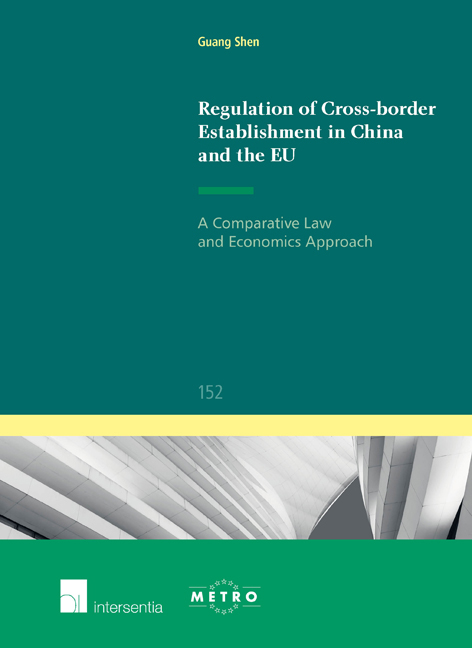Book contents
- Frontmatter
- Acknowledgements
- Contents
- List Of Abbreviations
- Chapter 1 Introduction
- PART I LEGAL ANALYSIS
- PART II THEORETICAL FRAMEWORK
- PART III ECONOMIC EVALUATION
- Chapter 6 An Economic Analysis Of Regulation Of The Inter-Provincial Establishment Of Companies In China
- Chapter 7 Regulation Of The Inter-Provincial Establishment Of Companies In China: Learning From Europe?
- Chapter 8 Conclusions
- Valorisation Addendum
- Bibliography
- Curriculum Vitae
- Ius Commune Europaeum
Chapter 8 - Conclusions
from PART III - ECONOMIC EVALUATION
Published online by Cambridge University Press: 13 December 2017
- Frontmatter
- Acknowledgements
- Contents
- List Of Abbreviations
- Chapter 1 Introduction
- PART I LEGAL ANALYSIS
- PART II THEORETICAL FRAMEWORK
- PART III ECONOMIC EVALUATION
- Chapter 6 An Economic Analysis Of Regulation Of The Inter-Provincial Establishment Of Companies In China
- Chapter 7 Regulation Of The Inter-Provincial Establishment Of Companies In China: Learning From Europe?
- Chapter 8 Conclusions
- Valorisation Addendum
- Bibliography
- Curriculum Vitae
- Ius Commune Europaeum
Summary
Research Questions and Summary of Findings
In the introduction of this book, two main research questions were posed:
To what extent can regulation of inter-provincial establishment of companies in China be considered as serving public interest or private interest goals?
To what extent can we learn lessons from the economic theory and the EU experience for the regulation of inter-provincial establishment?
These main research questions were divided into a number of sub-questions. The following will first reproduce these sub-questions and then provide answers to them, divided into the respective parts of this dissertation.
Part I. Legal Analysis
Question 1: What regulations exist in China concerning the inter-provincial establishment of companies and how are they enforced?
Chinese authorities impose minimum capital requirements and licensing requirements on firms expanding across provinces. The establishment by companies across provinces can take the form of either subsidiaries or branches. Minimum capital requirements apply for subsidiaries, but not for branches. Apart from capitalization rules, it is also necessary to obtain an establishment registration license to open subsidiaries and branches in China. Other licensing obligations for inter-provincial establishment are presented as follows.
According to the Company Law (2005), domestic firms that want to form branches or subsidiaries in another province need to acquire permission ‘if the business scope of these branches and subsidiaries contains any matter subject to approval’. Moreover, if the incorporation of the branches and subsidiaries invested in is subject to approval, it is necessary to complete the relevant approval formalities before registering the establishment.
In terms of the inter-provincial establishment by Foreign Invested Enterprises (FIEs), FIEs opening subsidiaries in designated ‘restricted investment fields’ also need to obtain approval from commercial agencies, in addition to registering their establishment. Before permitting establishment, commercial authorities need to ask for the opinions of authorities administrating the fields these subsidiaries operate in. When subsidiaries are established in ‘permitted and encouraged fields’, such establishment only needs to go through the registration procedure. FIEs forming branches in any of the ‘restricted, permitted or allowed fields’ are asked to obtain project approval from the Development and Reform Commissions (DRCs) prior to registering their establishment.
- Type
- Chapter
- Information
- Regulation of Cross-Border Establishment in China and the EU , pp. 255 - 262Publisher: IntersentiaPrint publication year: 2016



